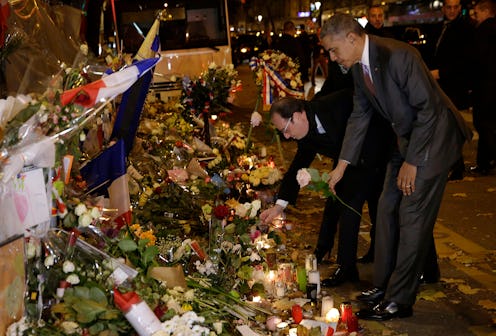News
Obama Visits Site Of Paris Attacks Le Bataclan
Late Sunday night, President Obama paid his respects at Le Bataclan, one of the sites of the November terrorist attacks in Paris. Laying a flower and bowing his head in silence, Obama not only paid his respects to the victims, but also underlined just how recently — just over two weeks ago — the French capital was on lockdown, after shootings and suicide bombings killed 130 people. As Obama and other world leaders arrive in town to hammer out a deal to cap greenhouse gases and fight global warming, security remains on high alert, and French officials have used state of emergency laws to control public protests.
After the attack, Obama and other world leaders pledged to carry on and convene in Paris, not letting terrorism win. Since then, France found and killed the "mastermind" of the attacks, Abdelhamid Abaaoud, a 28-year-old Belgian who spent time in Syria. He died in a massive shootout with police less than a 15-minute drive from the climate talks. Also, in extraordinary measures, police have conducted more than 800 searches, and more than 310 people have also been put under house arrest. Two of the attackers, however, are still on the run. And just last week, Brussels was on lockdown as police tried to round up potential attackers.
Security was stepped up for Obama's visit to the theater. Helicopters were flying overhead and area roads were closed as the president's motorcade made its way to the site. It was his first stop after leaving Orly Airport, the second-largest airport in Paris, for the south of the city center. He was accompanied by French President Francois Hollande and Paris Mayor Anne Hidalgo. The three each laid a rose in front of Le Bataclan, where 90 died in the fire of gunmen with automatic rifles, grenades, and suicide vests during a rock concert.
Some highways were also closed in Paris Monday morning as an added precaution for Obama and other world leaders, who were making their way to a conference center in Le Bourget, a suburb north of the city. Riot police vans and plainclothes officers have also been put on patrol. Border controls, in place since the attacks, are being manned by 8,000 police, and 1,000 travelers considered security risks have been turned away. The sale or transport of flammable materials, from gas cylinders to firecrackers, has also been banned.
Climate activists made up at least 24 of those under house arrest in France. The state of emergency called after the attacks, and extended for three more months by Parliament, has banned public protests and expanded the police's search and seizure capabilities. Another 317 were detained Sunday, after a protest against climate change turned violent. Police fired tear gas at the protesters throwing bottles and candles.
French Interior Minister Bernard Cazeneuve said that any public disturbance distracted the police from the fight against terrorism. "These people have no connection at all with the terrorist movement, but our forces need to be totally focused on the protection of the French people."
The goal of the climate talks is to cement a deal to replace the Kyoto Protocol which would limit carbon and greenhouse gas emissions. Some observers say that a deal is more likely in the wake of the attacks. The number of world leaders set to attend increased after the attacks as a show of solidarity. Some 147 heads of state are now scheduled to meet — not to mention journalists, government officials and climate activists. Some of the activists, including Prince Charles, have even said that a climate agreement will help limit one of terrorism's causes.
Given the limitations on protests, the the terrorist attacks may be seen as the deciding factor in the negotiations, whether or not a deal is reached. For the environment's sake, let's hope that the atmosphere of solidarity lasts until the conference wraps up on Dec. 11.
